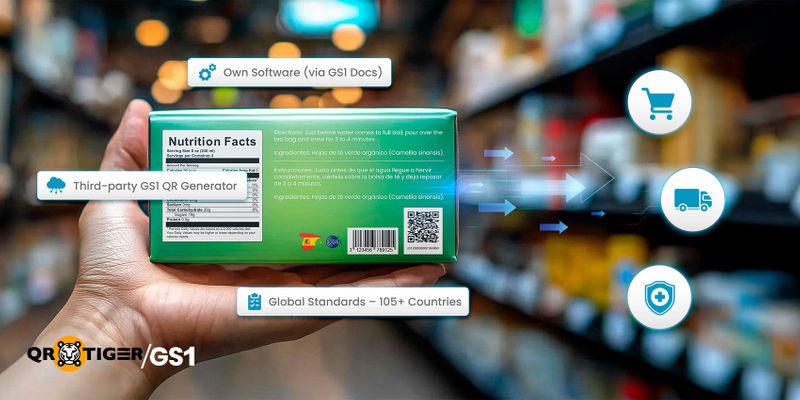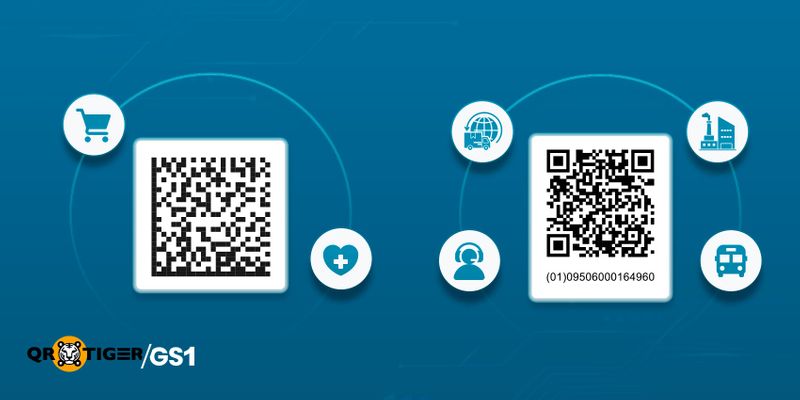GS1 Spain: Standardizing Supply Chain Processes

Standardized identification and data-driven solutions are essential for efficiency, compliance, and business growth in Spain's dynamic business landscape. GS1 Spain plays a vital role in this transformation by providing globally recognized standards that simplify operations across industries.
With a focus on digitalization and efficient data exchange, it supports barcode implementation, electronic invoicing, and logistics tracking, ensuring smooth communication between industries.
This article explores how GS1 standards help businesses to navigate Spain’s evolving market demands while driving innovation and operational success.
Table of Contents
What is GS1 Spain?
It was originally known as GS1 Spain (ES) is a member organization (MO) of GS1. It helps businesses automate and standardize supply chain processes using globally recognized GS1 standards.
Established in 1977, it was originally known as the Asociación Española de Codificación Comercial (AECOC). It was created to promote the introduction of the barcode in Spain. It has now evolved to offer industry and distribution an essential framework for collaboration in order to reach the consumer in the most effective way possible.
The MO collaborates closely with companies to identify opportunities for improvement, offering consulting, training, and research services to enhance operations.
GS1 ES uses barcodes and RFID to enhance traceability, efficiency, and data accuracy from the initial product stages to the final customer.
Starting from the fast-moving consumer goods (FMCG) sector, GS1 ES has expanded to support food, textiles, pharmaceuticals, sports, healthcare, and more, helping both large enterprises and small and medium-sized enterprises (SMEs).
GS1 standards help businesses identify, track, and share information about products, services, and locations. The system improves communication and visibility, making supply chains more efficient and reliable.
Address: Ronda General Mitre 10, 08017, Barcelona, Spain
Contact no: + 34 93 252 39 00
Email: info@gs1es.org
Collaborated Campaign
Through collaborative campaigns, GS1 ES helps companies adopt smart solutions and global standards for improved efficiency.
Revolutionized fleet management
GS1 ES has GS1 Spain has helped improve fleet management efficiency by introducing GS1 standards in transport and logistics. In 2009, it formed a working group with major companies like El Corte Inglés, Mercadona, DHL, and Campofrío to optimize fleet operations.
By using GS1 standards, businesses reduced transportation risks, ensured regulatory compliance, and improved cold-chain management for perishable goods. The initiative also enhanced vehicle tracking with GPS and cellular network triangulation, allowing companies to monitor mileage, fuel consumption, temperature, and vehicle status in real time.
APBA improved supply chain efficiency
The Port Authority of the Bay of Algeciras (APBA) manages the Ports of Algeciras Bay and Tarifa. It partnered with GS1 Spain to improve supply chain efficiency. By adopting GS1 global standards, APBA created a common language for data exchange, ensuring smooth communication between logistics operators.
One significant improvement was the use of Global Location Numbers (GLNs), which uniquely identify locations and stakeholders in the port system. This helped automate Electronic Data Interchange (EDI), reducing complexity and improving operational accuracy.
APBA also implemented Electronic Product Code Information System (EPCIS) technology to track cargo movements in real time, enhancing product visibility and traceability across the supply chain.
These innovations improved cargo tracking, logistics coordination, and system interoperability, allowing businesses to access accurate and transparent data for faster processing and fewer errors.
By integrating the GS1 Digital Link QR code, APBA allowed customers to scan and access detailed product information, including ingredients and origin. This transparency encourages purchases.
GS1 standards services offered by AECOC
AECOC provides businesses with globally recognized standards that enhance supply chain efficiency, traceability, and digitalization. These standard services provided by AECOC are outlined below.
Barcode Implementation & Standardization

Today, businesses worldwide use the GS1 standard system to identify products and logistics units, with adoption in over 105 countries. GS1 ES ensures accurate product identification and traceability in retail, healthcare, and logistics, helping companies maintain compliance and operational efficiency.
Companies can develop their own software by following GS1’s implementation guidance and standards documentation. Alternatively, they can use a third-party service like GS1 QR code generator by QR Tiger to easily encode product data using GS1 formats.
Electronic invoicing
AECOC has over 5,600 users of electronic invoicing, ensuring efficient and standardized transactions.
Through GS1 EDI (Electronic Data Interchange), companies can automate data exchange between businesses, reducing errors and improving data accuracy. It provides global standards that enable the automation of commercial transactions throughout the supply chain.
This system covers order management, delivery tracking, and financial settlements, streamlining operations across the entire supply chain.
Each company is assigned a Global Location Number (GLN), a unique identifier that helps track warehouses, departments, and business locations, ensuring smooth communication and traceability.
Global Data Synchronization Network (GDSN)
It allows businesses to share accurate product information across supply chains using a GS1-certified catalog globally. This ensures consistency, compliance, and efficient data exchange between trading partners.
Applications of 2D barcodes across industries in Spain

As a part of GS1 Sunrise 2027 initiative, industries worldwide will begin using 2D barcodes in supply chain systems and point-of-sale (POS). Several countries, including Canada, Germany, etc. have already started switching to 2D barcodes.
Note that this is not a forced change. Businesses can continue using 1D barcodes if they prefer. 2D barcodes offer more flexibility, a future-ready option that meets industries’ need for better transparency, product traceability, and data sharing.
2D barcodes have become an essential tool across industries in Spain, enhancing efficiency, traceability, and consumer engagement. From retail to logistics, businesses are leveraging QR codes and GS1 DataMatrix to optimize operations and improve transparency.
Retail & e-commerce
With over 91% of Spaniards using smartphones, QR codes have become a powerful tool for connecting the physical world with digital experience. Spanish retailers use QR codes for mobile payments, product authentication, and customer engagement.
Leading supermarket chains like Carrefour and Mercadona have integrated GS1 DataMatrix barcodes for inventory tracking and checkout efficiency. GS1 retail barcodes on product packaging allow customers to access detailed ingredient lists and sustainability information.
With GS1 Digital Link technology, buyers can scan the code through a smartphone to trace the product’s origin and characteristics.
Healthcare
Barcode Spain initiatives leverage GS1 DataMatrix technology to ensure precise tracking of medications, patient identification, and medical devices. As a result, they enhance safety, authenticity, and regulatory compliance across the healthcare system.
They help hospitals comply with EU Falsified Medicines Directive (FMD) regulations, reducing counterfeit risks and enhancing traceability.
Hospitals also scan 2D barcodes on patient wristbands to link medical records and avoid errors in treatment. GS1 Spain collaborates with over 1,200 companies to enhance efficiency and competitiveness in the healthcare sector. Through multidisciplinary working groups, they focus on improving safety and traceability across the industry.
Logistics & supply chain
Spanish logistics companies like Correos and SEUR use 2D barcodes for package tracking and warehouse automation. These barcodes improve real-time inventory visibility and help businesses comply with Spain’s strict traceability regulations for food and pharmaceutical products.
In the wine industry, businesses use GS1 QR code for detailed product information, allowing consumers to access origin, production methods, and certifications with a simple scan. These QR codes also help companies enhance transparency and build trust with customers.
Manufacturing
Spanish manufacturers use 2D barcodes to ensure quality control, product authentication, and compliance tracking.
Automotive companies like Gestamp and SEAT can use DataMatrix barcodes to track components, reducing defects and meeting regulations. In textiles, QR codes improve supply chain transparency, helping consumers verify ethical sourcing.
Why register AECOC?
Registering AECOC gives businesses access to GS1-certified codes, ensuring products are correctly listed on marketplaces globally. These codes also work for traditional retail, making sales smooth across different platforms.
You gain following benefits as a GS1 ES partner:
- Free technical support to help create and manage your codes.
- Continuous training to enhance your marketplace sales strategy.
- Access to exclusive tools like ACTIVATE for code generation and AECOC MEDIA for faster catalog uploads.
- Access to member-only content for industry insights and best practices.
AECOC ascertains that your business stays compliant, competitive, and prepared for global expansion.
Driving Business Efficiency with GS1 ES
GS1 Spain helps businesses improve supply chain transparency, digitalization, and compliance across industries. By providing standardized identification, traceability solutions, and seamless data exchange, it ensures companies meet Spain’s market demands and European regulations.
The MO supports SMEs in adopting digital solutions, helping them stay competitive in a connected economy. By joining GS1 ES, businesses can streamline workflows, enhance product authentication, and maintain global compliance to achieve long-term success.
FAQs
What is the GS1 ES member registration fee?
The GS1 ES member registration fee for companies with less than €100,000 turnover is 100 € and annual fee is 210 € (they get an 83.3% discount).
Companies with turnover between €100,000 and €500,000 get a 50% discount, paying €300 as registration fee, and 210 € as annual fee. Companies with turnover above €500,000 and up to €500,000,000 pay the full €600 registration fee.
Do I need to register with AECOC to get the barcodes in Spain?
Yes, to obtain an official GS1 barcode, you must join a GS1 member organization. In Spain, AECOC is the only GS1 organization. When you register, AECOC assigns you a GS1 prefix, which links to your VAT number and allows you to generate unique product codes for global use.
Does GS1 ES offer training or support?
Yes, GS1 ES provides webinars, documentation, and personalized support to help companies correctly implement standards. You can contact them via phone (+ 34 93 252 39 00) or email (info@gs1es.org).
DISCLAIMER: We acknowledge that GS1, as well as the materials, proprietary items, and all related patents, copyright, trademark, and other intellectual property (collectively, “intellectual property”) relating to its use, are the property of GS1 Global, and that our use of the same shall be in accordance with the conditions provided by GS1 Global.




